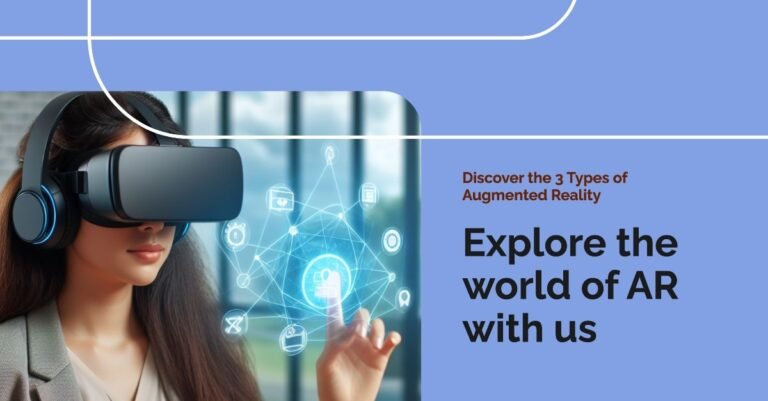Is augmented reality a good career?
So, you’re wondering, “Is augmented reality a good career choice?” Let me share my insights. Augmented reality (AR) is rapidly transforming industries with its immersive technology that blends digital elements with the real world. This career path not only offers an intriguing blend of technology and creativity but also comes with significant growth potential. If you’re passionate about tech and innovation, AR could be the perfect field for you. In this article, we’ll delve into the various aspects of an AR career, explore job opportunities, and highlight why this could be an excellent choice for your future.
What is Augmented Reality?
Before we dive deeper, let’s clear up what augmented reality actually entails. AR involves overlaying digital information—like graphics, sounds, or other sensory inputs—onto the real world. Unlike virtual reality, which creates a completely new digital environment, AR enhances the real world with additional information. Think of Pokémon GO, where you see virtual Pokémon appearing in real-world locations. That’s AR in action!
The Growing Demand for AR Professionals
If you’re asking, “Is augmented reality a good career?” one major factor to consider is the increasing demand for AR professionals. This field is experiencing rapid growth, and here’s why it’s such an exciting time to get involved.
1. Expanding Industry Applications
Augmented reality isn’t just a cool tech trend; it’s becoming a crucial part of various industries. Let me break down how different sectors are tapping into AR:
- Gaming and Entertainment: Remember how Pokémon GO had everyone catching virtual Pokémon in real parks? That’s AR creating a buzz in the gaming world. As more games and interactive experiences use AR, the demand for developers and designers to create these engaging experiences is skyrocketing.
- Retail: Imagine shopping online and being able to see how a piece of furniture looks in your living room before buying it. That’s exactly what AR apps like IKEA Place are doing. Retailers are using AR to enhance the shopping experience, making it more interactive and personalized. This need for AR-driven solutions in retail means more opportunities for professionals who can design and develop these experiences.
- Healthcare: In the medical field, AR is proving to be a game-changer. Surgeons use AR to overlay vital information during procedures, while medical students use AR simulations for training. As healthcare adopts more AR applications, there’s a growing need for experts who can develop and maintain these advanced systems.
- Education: AR is transforming how we learn by making lessons more interactive. For instance, students can explore ancient civilizations or the human body in 3D right in their classrooms. This shift towards interactive learning drives the demand for AR content creators and educational technologists.
2. Innovative Technology
The world of AR is continually evolving with new technologies. Here’s how:
- Advancements in Hardware: Devices like AR glasses and headsets are becoming more sophisticated. Companies are investing in creating more comfortable, high-performance devices. This evolution in hardware opens up new opportunities for engineers and designers to develop cutting-edge AR solutions.
- Software Development: As AR technology advances, so do the software platforms used to create AR experiences. Innovations in AR software are making it easier to develop and deploy AR applications. This progress means that more skilled professionals are needed to leverage these tools and push the boundaries of what AR can do.
3. High Earning Potential
Another great reason to consider a career in AR is the potential for high earnings. Here’s why:
- Specialized Skills: AR requires a unique skill set, including knowledge of programming, 3D modeling, and user experience design. These specialized skills are in high demand, which often translates to higher salaries for AR professionals.
- Growing Investment: Companies are investing heavily in AR technology because they see its potential. This investment creates more high-paying job opportunities in the field, from development to management.
4. Global Opportunities
AR isn’t limited to one part of the world; it’s a global phenomenon. Whether you’re in the tech hubs of Silicon Valley, the creative centers of Europe, or anywhere else, there’s a growing demand for AR expertise. This global reach means you can find AR career opportunities in diverse locations and industries.
5. The Future Looks Bright
The future of AR is incredibly promising. With continuous advancements in technology and an ever-expanding range of applications, the field is set to grow even more. This growth means that job opportunities in AR will likely increase, offering long-term career stability and advancement.
So, is augmented reality a good career choice? With its expanding applications, innovative technology, high earning potential, global opportunities, and a bright future, it’s clear that AR offers an exciting and rewarding career path. If you’re passionate about technology and eager to be at the forefront of digital innovation, AR might just be the perfect fit for you!
Career Paths in Augmented Reality
If you’re contemplating whether a career in augmented reality (AR) is right for you, understanding the different career paths available can help you make an informed decision. AR is a versatile field with a variety of roles that cater to different skills and interests. Here’s a closer look at some of the exciting career paths you might explore in AR:
1. AR Developer
As an AR Developer, you’ll be at the heart of creating the interactive experiences that people enjoy. Here’s what this role involves:
- What You Do: AR Developers design and build the software that powers AR applications. This means writing code, working with AR development platforms, and integrating various elements like 3D models and animations into applications.
- Skills Needed: You’ll need strong programming skills, particularly in languages like C#, JavaScript, or Python. Familiarity with AR development frameworks such as Unity or Unreal Engine is also essential. Being able to troubleshoot and solve problems as you develop is key.
- Why It’s Exciting: You get to bring creative ideas to life and work on projects that might become the next big thing in gaming, retail, or other industries. It’s a role that combines technical expertise with creativity.
2. AR Designer
If you have a knack for visual design and user experience, an AR Designer role might be perfect for you. Here’s what to expect:
- What You Do: AR Designers focus on how AR applications look and feel. They design the user interface (UI) and user experience (UX), creating visually appealing and intuitive interactions. This includes designing 3D models, textures, and animations that users interact with.
- Skills Needed: A strong background in graphic design, 3D modeling, and user experience design is important. Tools like Adobe Creative Suite, Blender, or Maya are commonly used. Creativity and an eye for detail are crucial.
- Why It’s Exciting: You get to shape how users interact with AR content, making their experience engaging and enjoyable. It’s a great way to merge artistic skills with technology.
3. AR Researcher
For those who enjoy exploring new technologies and pushing the boundaries of what’s possible, a career as an AR Researcher could be fulfilling:
- What You Do: AR Researchers investigate new AR technologies, develop innovative applications, and work on improving existing systems. They often work in academic settings, research labs, or tech companies.
- Skills Needed: You’ll need a strong background in research methods, technology, and often a relevant degree (like computer science or engineering). Analytical skills and a passion for innovation are essential.
- Why It’s Exciting: You’ll be at the cutting edge of AR technology, discovering new possibilities and contributing to advancements that could shape the future of the field.
4. AR Product Manager
If you’re interested in overseeing the development of AR products from start to finish, consider a role as an AR Product Manager:
- What You Do: Product Managers coordinate the development process of AR applications. They work with developers, designers, and other stakeholders to ensure that the product meets user needs and business goals. They handle project planning, market research, and product strategy.
- Skills Needed: Strong organizational and communication skills are crucial. You should be able to understand technical details and market trends. Experience in product management and a good grasp of AR technology are beneficial.
- Why It’s Exciting: You’ll have a hand in shaping the direction of AR products and ensuring they succeed in the market. It’s a role that combines leadership with strategic thinking.
5. AR Marketing Specialist
If you have a passion for marketing and want to promote AR products, a career as an AR Marketing Specialist might be for you:
- What You Do: Marketing Specialists develop strategies to promote AR applications and drive user engagement. They create marketing campaigns, analyze market trends, and work on branding and user acquisition.
- Skills Needed: Strong skills in marketing, data analysis, and a good understanding of AR technology are important. Creativity and the ability to craft compelling messages are also key.
- Why It’s Exciting: You’ll help bring AR products to the public, showcasing their benefits and generating interest. It’s a great way to blend marketing skills with cutting-edge technology.
How to Get Started
No matter which path interests you, here are a few steps to get started in the AR field:
- Education: Consider pursuing a degree in computer science, graphic design, or a related field. Specialized AR courses can also provide valuable skills.
- Build a Portfolio: Whether you’re a developer, designer, or researcher, having a portfolio of your work can showcase your skills to potential employers.
- Stay Updated: AR technology is rapidly evolving, so staying current with the latest trends and advancements is crucial.
- Network: Join AR communities, attend industry events, and connect with professionals in the field. Networking can open doors to job opportunities and collaborations.
So, is augmented reality a good career choice? With a variety of roles and growing demand, AR offers numerous opportunities for those passionate about technology and innovation. Whether you’re drawn to development, design, research, or management, there’s a path for you in this exciting field.
Skills and Qualifications Needed for a Career in Augmented Reality
Is augmented reality a good career? If you’re thinking about diving into a career in augmented reality (AR), understanding the skills and qualifications required can give you a head start. Whether you’re interested in developing AR applications, designing immersive experiences, or managing AR projects, here’s a comprehensive guide to the skills and qualifications you’ll need to succeed in this exciting field.
1. Technical Skills
Programming Skills: To build AR applications, you’ll need a strong grasp of programming languages. Common languages in AR development include:
- C#: Widely used with Unity, a popular AR development platform.
- JavaScript: Useful for web-based AR applications.
- Python: Often used for scripting and automation in AR projects.
Understanding AR Frameworks: Familiarity with AR development platforms is crucial. Key frameworks and tools include:
- Unity: A leading game engine used for creating AR experiences. Unity’s versatility makes it a go-to for many AR developers.
- Unreal Engine: Another powerful game engine, known for its high-quality graphics and complex AR capabilities.
- ARKit & ARCore: Apple’s ARKit and Google’s ARCore are essential for developing AR applications on iOS and Android devices, respectively.
3D Modeling: For those involved in creating AR content, skills in 3D modeling and animation are important. Tools like:
- Blender: A free, open-source tool for 3D modeling and animation.
- Maya: A professional tool used for creating detailed 3D models and animations.
2. Design Skills
User Interface (UI) Design: Creating intuitive and engaging interfaces is key in AR. You’ll need to:
- Design Visual Elements: Develop buttons, menus, and other interactive elements that users interact with in AR applications.
- Understand UX Principles: Focus on how users interact with AR and ensure a smooth, engaging experience.
3D Design: Beyond modeling, understanding how to create and integrate 3D assets into AR environments is crucial. This involves:
- Texturing and Lighting: Applying textures to models and setting up lighting to make virtual objects blend seamlessly with the real world.
- Animation: Making objects move and respond in realistic ways, enhancing the immersive experience.
3. Analytical and Problem-Solving Skills
Critical Thinking: Being able to analyze complex problems and develop innovative solutions is essential. Whether troubleshooting issues in an AR application or optimizing performance, strong analytical skills will serve you well.
Attention to Detail: AR development requires a keen eye for detail. Small errors can affect the overall user experience, so precision is important in coding, designing, and testing.
4. Qualifications and Education
Educational Background: Many AR professionals come from backgrounds in:
- Computer Science: Provides a strong foundation in programming and software development.
- Graphic Design: Offers skills in visual design and user experience.
- Engineering: Useful for understanding the technical aspects of AR hardware and software.
Specialized Courses: There are also specialized courses and certifications in AR that can boost your qualifications. Look for:
- AR Development Courses: Many online platforms offer courses on Unity, ARKit, ARCore, and other AR technologies.
- 3D Modeling and Animation Classes: Courses in these areas can help build skills needed for creating AR content.
5. Soft Skills
Communication: Good communication skills are crucial, especially if you’re working on a team. You’ll need to clearly convey your ideas, provide feedback, and collaborate effectively with others.
Project Management: If you’re aiming for a role in AR project management, skills in organizing, planning, and executing projects will be important. Understanding how to manage timelines, budgets, and resources is key to delivering successful AR projects.
Creativity: AR is a field driven by innovation. Being creative helps you come up with new ideas and solutions that make AR experiences unique and engaging.
Getting Started
- Build a Strong Foundation: Start with a relevant degree or coursework in computer science, design, or engineering.
- Develop a Portfolio: Work on personal projects or internships to build a portfolio showcasing your skills in AR development or design.
- Stay Updated: AR technology evolves rapidly. Keep learning and stay updated with the latest trends and tools.
- Network: Connect with professionals in the field through forums, meetups, and industry events.
So, is augmented reality a good career choice? With the right mix of technical skills, design expertise, qualifications, and soft skills, AR offers a dynamic and rewarding career path. Whether you’re passionate about technology, design, or innovation, there’s a place for you in the world of AR!
Real-Life Examples and Case Studies
Example 1: Pokémon GO Success
Pokémon GO is a prime example of how AR can revolutionize entertainment. The game’s success demonstrated the vast potential of AR in engaging millions of users worldwide.
Example 2: IKEA Place App
IKEA Place allows customers to visualize furniture in their homes using AR. This app has improved the shopping experience by helping customers make better purchasing decisions.
Challenges in the AR Field
While AR is an exciting career choice, it’s not without its challenges:
- Technological Hurdles: Developing AR experiences requires overcoming technical limitations, such as ensuring seamless integration between digital and real-world elements.
- High Competition: As the field grows, so does competition for top positions. Continuous learning and skill development are essential to stay ahead.
Future Prospects
Looking ahead, AR is set to become even more integrated into our daily lives. With advancements in technology and increasing applications across various sectors, the career prospects in AR are promising. Companies are investing heavily in AR research and development, indicating a robust job market for AR professionals.
FAQs – Is augmented reality a good career?
1. What skills do I need for a career in augmented reality?
You’ll need skills in programming, 3D modeling, problem-solving, and creativity.
2. How can I get started in AR?
Consider pursuing a degree in a related field, taking specialized AR courses, and gaining practical experience through projects or internships.
3. What are some popular AR applications?
Popular AR applications include Pokémon GO, IKEA Place, and various interactive educational tools.
4. What is the job outlook for AR professionals?
The job outlook is positive, with increasing demand across various industries as AR technology continues to evolve.
Conclusion
In summary, is augmented reality a good career? Absolutely! With its growing applications, high earning potential, and exciting technology, AR offers a dynamic and rewarding career path. Whether you’re interested in development, design, research, or management, there’s a role for you in this expanding field.
If you’re ready to dive into an innovative and rapidly evolving industry, AR might just be the career choice you’re looking for. Stay updated with the latest trends and continue to develop your skills to make the most of this exciting opportunity!
Feel free to explore more about AR and its career opportunities on ARVRRealm.com for further insights and guidance.






